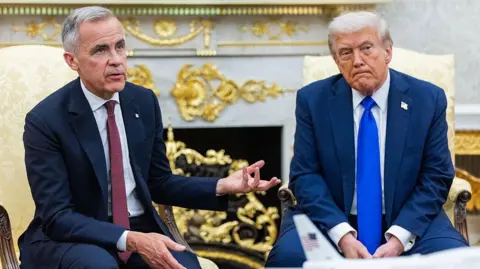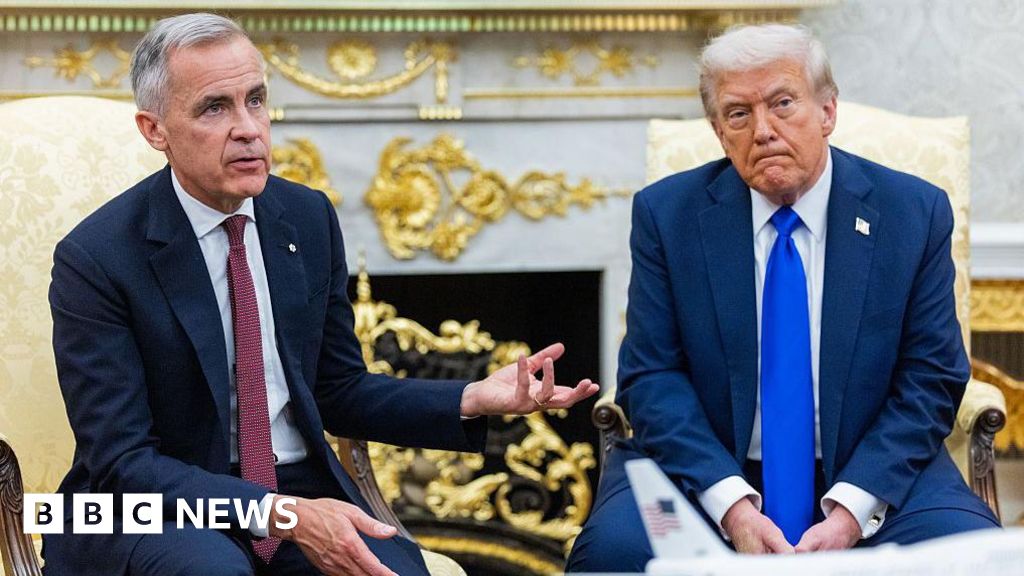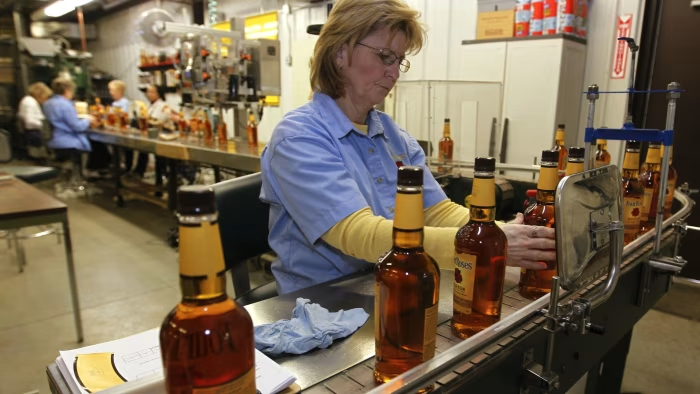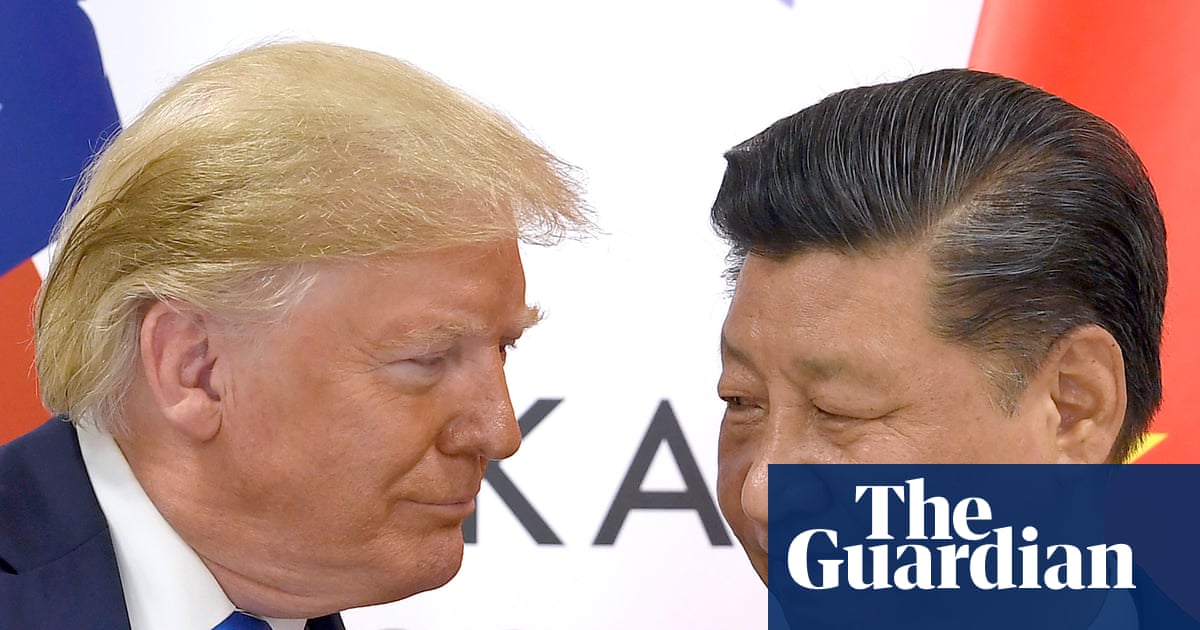Osmond ChiaBusiness reporter
 Getty Images
Getty ImagesUS President Donald Trump has said he is immediately ending all trade negotiations with Canada.
In a post on Truth Social, Trump wrote that the country had run an advert featuring former US President Ronald…

Osmond ChiaBusiness reporter
 Getty Images
Getty ImagesUS President Donald Trump has said he is immediately ending all trade negotiations with Canada.
In a post on Truth Social, Trump wrote that the country had run an advert featuring former US President Ronald…

Stay informed with free updates
Simply sign up to the Pensions industry myFT Digest — delivered directly to your inbox.
Big pension funds are scooping up private equity professionals seeking refuge from a downturn in the sector that has restricted the carried interest payments that traditionally made up most of their pay.
Professionals from mid-market buyout groups, in particular, have been flooding pension plan recruiters with their résumés in a bid to escape the private equity fundraising squeeze.
“We are finding it easier to attract talent — not super easy, but much easier than three or four years ago,” said Ralph Berg, chief investment officer at the Ontario pension fund Omers.
“I suspect a lot of the private equity firms are struggling to hold on to people or maybe they want to manage . . . headcounts too.”
British Columbia Investment Management Corporation, which manages assets for public sector pensions, hired about 20 people in the past two years from buyout firms due to “fundraising issues” at those groups, a person familiar with the matter said. BCI’s private equity team has 70 people in total, according to its website.
The experience of the Canadian pension plans is the latest sign of how a prolonged downturn, initially ushered in by 2022 interest rate increases, is rippling through the financial sector.
The higher cost of borrowing hampered dealmaking and left firms with less cash to return to their institutional backers. This in turn reduced how much money those backers could recycle into new buyout funds.
Private equity groups raised just $592bn in the 12 months to June, their lowest tally for seven years, data from Preqin shows.
Tougher fundraising has led to lower revenue streams for buyout firms from management fees, leaving them with less cash to hire talent. Smaller firms have struggled the most with fundraising as buyout fund backers have flocked to larger groups which are seen as more reliable.
Berg of Omers said that the red hot mergers and acquisitions market in 2021 had made that a tough year for pension funds to retain staff.
But the more subdued dealmaking environment that has endured since meant that “people — especially juniors — have seen that there [have] been fewer deals to work on”, Berg said, adding that “they fundamentally worry that they are not . . . building up their CVs”.
“All of a sudden,” he added, “those employers that have their own capital and don’t depend on fundraising in order to make new investments and have more sustainable [compensation] structures with a higher level of predictability now look attractive.”
BCI declined to comment.

Unlock the Editor’s Digest for free
Roula Khalaf, Editor of the FT, selects her favourite stories in this weekly newsletter.
Japan’s Kirin Holdings has put its Kentucky bourbon brand Four Roses up for sale at a price of $1bn, as the brewer pivots away from the struggling spirits sector towards healthcare.
Kirin has been working with advisers from UBS to test interest from potential buyers in recent weeks, with first-round bids expected as early as next month, according to two people familiar with the matter.
The sale process comes during a tough period for brewers and distillers as they contend with changing habits among younger consumers, who are reducing alcohol consumption. In Japan, beer consumption has dropped, hurting Kirin’s core product.
Kirin and UBS declined to comment.
Kirin, a Japanese conglomerate that generates more than $15bn a year in sales and produces everything from lager and spirits to rare diseases medicines under its Kyowa Kirin subsidiary, has owned Four Roses since 2002.
Tracing its origins back to 1888, Four Roses is produced in a distillery in Lawrenceburg, Kentucky, in the heart of so-called Bourbon Country. Four Roses generated about $70mn in adjusted earnings annually and was expected to fetch as much as $1bn, the people said.
After first entering the pharmaceutical sector in the 1980s, Kirin has accelerated its push into healthcare in recent years, as well as shedding non-core beverage assets, such as a soft drinks joint venture in China.
Last year the company bought the skincare and supplements company Fancl as part of the effort. And in 2023 it launched a $1.3bn takeover for Australia’s largest vitamin company Blackmores.
Across 2024, Kirin’s pharmaceutical division generated 23 per cent of the group’s $15.4bn in total revenue, up from 20 per cent in 2020. Shares in Kirin are up 14 per cent so far this year, giving it a market value of nearly $13.6bn as of Thursday’s close.
Four Roses was likely to draw interest from strategic buyers, but some large drinks conglomerates might remain on the sidelines as they grappled with problems with their own product portfolios, the people said.
The S&P food and beverage index is down 4.9 per cent over the past year, whereas the wider S&P 500 index is up 16 per cent over the same period.
There were no guarantees that the sale process would result in a deal, the people cautioned. It is also possible that Kirin may opt to sell off a stake in the business through a joint venture, they added.

This is an audio transcript of the FT News Briefing podcast episode: ‘Trump’s Russian oil sanctions shake energy markets’
Marc Filippino
Good morning from the Financial Times. Today is Friday, October 24th, and this is your FT News Briefing….

In December 2015 I was staying at the Rosa Alpina in the South Tyrolean village of San Cassiano and the hotel was dancing towards another busy Christmas. That dance was a snow dance. Outside, strips of artificial snow snaked down the green…

Baker McKenzie has advised Pinnacle Investment Management Group Limited (ASX: PNI) (“Pinnacle”) on its strategic investment in Advantage Partners, Japan’s largest independent, locally-grown, diversified private markets platform.
The transaction also involves distribution services arrangements covering global distribution of Advantage Partners’ strategies.
This strategic investment will deepen Pinnacle’s presence and participation in Japan, and aligns with the company’s objective to diversify internationally and increase exposure to global private assets, particularly in the attractive mid-market area.
Pinnacle is a global multi-affiliate investment management firm that provides specialist investment managers with superior global distribution, fund infrastructure, and support services.
For further details about the transaction, please refer to the Company’s announcement.
The Baker McKenzie team was led by partners Robert Wright, Lance Sacks and Shirin Tang*, alongside counsel, John Nielsen, with support from associates Thara Ing**, Allan Yang**, Mathew Leow** and Samiha Asim.
With more than 2,700 deal practitioners in over 40 jurisdictions, Baker McKenzie is a transactional powerhouse. The Firm has the broadest M&A footprint of any law firm globally, with more than 1,300 locally qualified and globally experienced M&A lawyers. The team excels at advising clients on their most complex, cross-border M&A matters and has advised on more than USD 600 billion in M&A transactions in the last five years (Refinitiv; 2020-2024).
* Principal, Baker McKenzie Wong & Leow, Singapore
** Baker McKenzie Wong & Leow, Singapore

Nearly half of cannabis flower products sold in Colorado are inaccurately labeled for THC potency, with most overstating how strong they really are. In contrast, cannabis concentrates such as oils and waxes were found to be largely accurate, with…
You don’t have permission to access…

wastewater treatment in sewage treatment plants is essential for environmental and health protection. Before treated water can be discharged into rivers or lakes, it must meet strict quality requirements. These stipulate, for…

Donald Trump is about to embark on a tour of Asia that many hope will ease trade tensions with countries in the region and repair damaged ties with China. Trump will begin his trip on Sunday at a meeting of south-east Asian nations in Malaysia,…